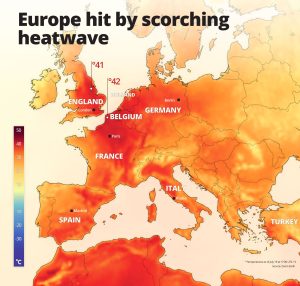Massive Wildfires Continue to Rage Across Southern Europe

As summer intensifies, Southern Europe finds itself engulfed in a series of devastating wildfires, fueled by relentless heatwaves and prolonged drought conditions. Countries including Greece, Italy, and Albania are battling blazes that threaten lives, homes, and the environment. With temperatures soaring and dry conditions persisting, the situation has escalated to alarming levels, prompting urgent calls for action from both local authorities and international organizations.
The European Forest Fire Information System (EFFIS) has reported that much of Southern Europe is currently at high to extreme risk of wildfires. The fire danger map has transformed into shades of dark orange and deep red, highlighting areas from Portugal to Greece that are particularly vulnerable. In Greece, the island of Evia has seen evacuations as flames encroach on populated areas, while in Italy, wildfires have ravaged the Monte Mario natural reserve near Rome, forcing residents to flee their homes.
The ongoing heatwave has not only exacerbated the fire risk but has also led to significant drought conditions across the region. Over 16% of EU land is experiencing early or severe drought, with central and southern Italy, northwestern Spain, and Greece being the hardest hit. In Sicily, an Italian navy tanker was deployed to deliver 12 million liters of water to alleviate the dire situation. This combination of extreme temperatures and dry soil has created a tinderbox environment, making forests more susceptible to ignition.
In Albania, firefighters, military personnel, and volunteers have been working tirelessly to control wildfires that have threatened coastal towns. The town of Shengjin faced significant danger as flames damaged structures and forced evacuations. Fortunately, with the assistance of helicopters and firefighting planes from Italy, the situation was contained before it could escalate further. Meanwhile, in North Macedonia, a tragic incident occurred when an elderly man lost his life due to smoke inhalation as wildfires raged near his village.
The impact of these wildfires extends beyond immediate dangers to life and property. Economically, wildfires can lead to substantial losses. A study indicated that the average wildfire season results in production losses of approximately €13 to €21 billion for Southern Europe. This economic toll is felt most acutely in sectors reliant on tourism, agriculture, and forestry, all of which are vital to the region’s economy. As flames consume vast areas of land, the repercussions ripple through local economies, affecting employment and livelihoods.
Climate scientists warn that the relationship between climate change and wildfires is a vicious cycle. Rising global temperatures contribute to drier conditions, which in turn increase the frequency and intensity of wildfires. This year, the summer has already seen record-breaking heat, with temperatures soaring to 40°C (104°F) in parts of Spain and Italy. Such conditions not only fuel fires but also hinder firefighting efforts, as the extreme heat poses risks to the health and safety of firefighters battling the blazes.
In response to the escalating crisis, European nations are mobilizing resources and support. Countries like Serbia have dispatched helicopters to assist North Macedonia in combating the wildfires. The EU has also activated its Civil Protection Mechanism, providing essential aid to affected regions. However, experts emphasize that these reactive measures are not enough. A comprehensive strategy focusing on prevention, preparedness, and sustainable management of natural resources is crucial to mitigate the impact of future wildfires.
Looking ahead, the forecast remains grim. Meteorologists predict that the heatwave will continue to spread, potentially affecting Romania and Bulgaria in the coming weeks. Authorities are urging residents and tourists alike to remain vigilant and prepared for possible evacuations. As the wildfires rage on, the need for effective communication and community engagement becomes increasingly vital to ensure safety and resilience in the face of this growing threat.
The wildfires ravaging Southern Europe serve as a stark reminder of the urgent need for climate action. As the region grapples with the immediate consequences of these fires, the long-term implications of climate change loom large. The interplay between rising temperatures, drought conditions, and wildfires highlights the critical importance of addressing climate change at both local and global levels. Without decisive action, the cycle of destruction will only intensify, leaving communities to bear the brunt of an increasingly volatile climate.
In conclusion, the wildfires in Southern Europe are not merely a seasonal occurrence but a complex crisis exacerbated by climate change. As nations continue to battle the flames, the focus must shift towards sustainable solutions that prioritize prevention and resilience. The time to act is now, for the future of Southern Europe hangs in the balance.

